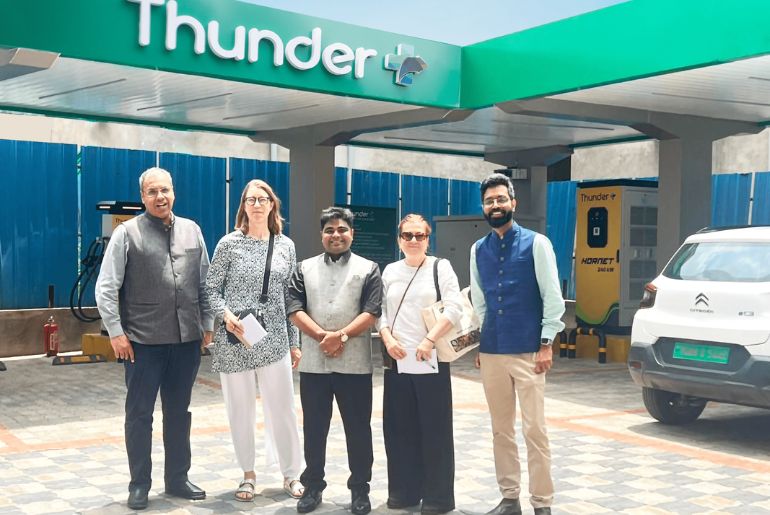ThunderPlus, India’s fastest-growing electric vehicle charging network, recently hosted a distinguished academic delegation from Stanford University and the University of Cambridge. The delegation included Prof. Erica L. Plambeck, Holloway Professor of Operations, Information & Technology at Stanford Graduate School of Business, and Prof. Feryal Erhun, Professor of Operations & Technology Management at Cambridge Judge Business School, accompanied by Dr. Parshuram Hotkar, Professor at the Indian School of Business (ISB), Hyderabad.
The high-profile visit was part of a wider research study aimed at understanding India’s evolving electric vehicle (EV) ecosystem and examining ThunderPlus’ role in enabling its growth. The researchers explored how startups and enterprises are tackling technological and infrastructural hurdles while accelerating the country’s EV revolution.
During the immersive session, Mr. Rajeev YSR, CEO of ThunderPlus, detailed India’s rapid EV infrastructure journey. He highlighted ThunderPlus’ mission to transform “charge anxiety” into “charge accessibility” through its innovative, full-stack platform, aiming to build the nation’s most reliable and accessible EV charging network.
A key highlight of the visit was a tour of ThunderPlus’ flagship Dynamic Load Sharing Charging Station in Secunderabad—a pioneering facility with a 0.5 MW capacity capable of charging 20 vehicles at once. The delegation also learned about the “Har Ghar Thunder” campaign, which brings affordable, compact chargers (priced under $100) to homes and small businesses. The grassroots initiative resembles India’s iconic STD booth model, enabling citizens to earn passive incomes of $100–200 per month and democratizing EV charging access across urban and semi-urban India.
The delegation engaged with last-mile delivery agents who use ThunderPlus’ fully cashless, unmanned, remotely operated charging stations and praised India’s robust fintech and digital integrations in the mobility sector.
As part of their visit, the team also explored ETO Motors, a leading EV mobility company known for its focus on women’s empowerment. The professors interacted with female “pilots” operating electric three-wheelers under ETO’s platform. Ms. Preethi Belinda Jasti, VP of Operations & Women Empowerment at ETO Motors, highlighted how more than 500 women pilots are working with ETO today, citing Kevadia, Gujarat, where over 150 women manage the entire EV mobility ecosystem around the Statue of Unity—setting a strong precedent for inclusive transportation.
Prof. Plambeck praised the innovation and social impact demonstrated by ThunderPlus and ETO Motors, noting how these stories serve as global examples of grassroots progress, digital enablement, and sustainable mobility.
“The stories from ThunderPlus and ETO Motors are not just Indian success stories—they are global inspirations,” Prof. Plambeck remarked. “Neighboring countries must urgently learn from India’s rapid progress and move away from lead-acid batteries toward modern LFP or other lead-free battery technologies.”
As Prof. Plambeck continues her research tour in Dhaka, Bangladesh, she pointed out that it requires regional collaboration and knowledge-sharing to achieve sustainable mobility goals.
ThunderPlus’ commitment to transforming India’s EV landscape—from mass accessibility of charging to empowering local communities—stood out as a model for scalable, inclusive, and technology-driven innovation.

